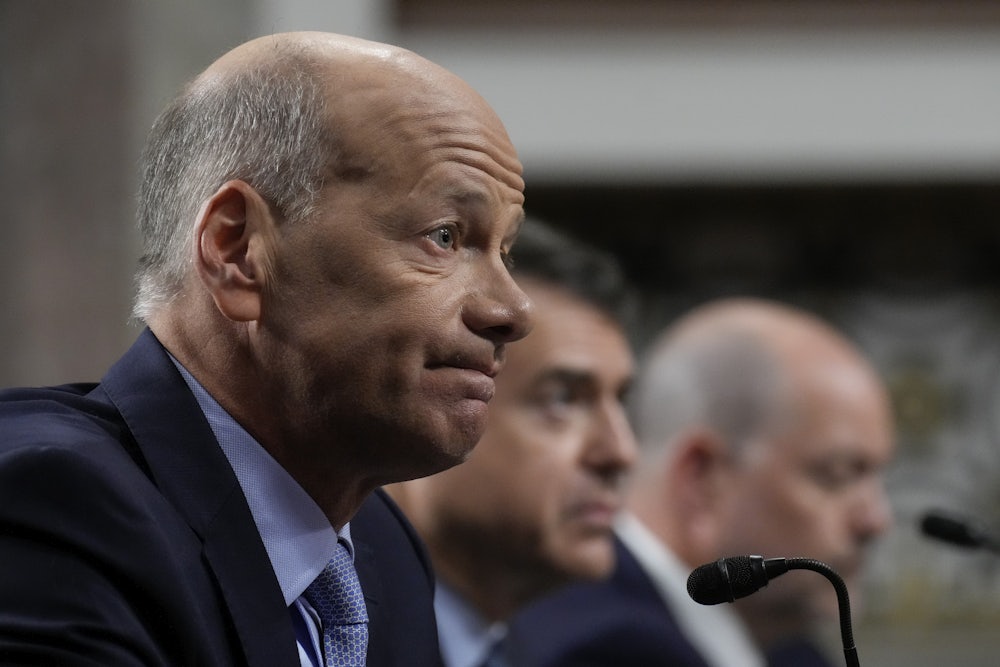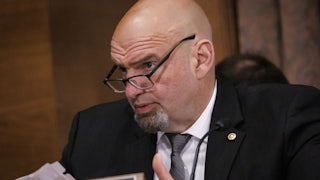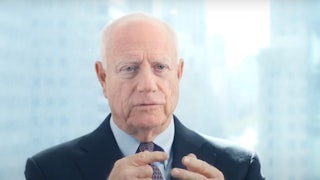If you’re a top bank executive and your bank fails on your watch, this is what you say when called before the Senate Banking Committee:
It’s not my fault!
And, if you’re feeling especially feisty:
It’s the Fed’s fault!
This last was from Gregory W. Becker, former chief executive of Silicon Valley Bank, or SVB, in his prepared testimony:
The messaging from the Federal Reserve was that interest rates would remain low and that inflation that was starting to bubble up would only be transitory. [italics his]
Becker, who repeated that sentiment under questioning by Senator Jon Tester, Democrat of Montana, absorbed most of the blows from his Senate interlocutors. Former Signature Bank chairman Scott A. Shay and current Signature chairman Eric R. Howell were less voluble in their prepared testimonies, and perhaps that reduced their savaging. Still, executives at both banks made clear, under questioning, that it’s not my fault!
SVB’s Becker, asked by Senator Raphael Warnock, Democrat of Georgia, whether poor management caused SVB’s failure, replied: “It was a series of unprecedented events that all came together in the fastest bank run in history.”
Signature’s Howell to Senator Catherine Cortez Masto, Democrat of Nevada: “I don’t believe there was mismanagement at the bank.”
Were it you or me sitting at that witness table, we might play the tragic hero and accept responsibility for SVB’s or Signature’s failure. “When the ship runs aground, the buck stops with the skipper.” That sort of thing. The ship’s captain metaphor is one I’ve applied to this scandal before, and at the hearing, so did J.D. Vance, the freshman Republican senator from Ohio. It’s what big shots are advised to say in leadership seminars even when they don’t especially feel blameworthy. As William Ernest Henley put it in his 1888 poem “Invictus,” which every corporate chairman encounters at one time or another:
It matters not how strait the gate,
How charged with punishments the scroll,
I am the master of my fate,
I am the captain of my soul.
But Becker and Shay and Howell have surely been advised by their lawyers to avoid such theatrics. They’re not free to assume responsibility for their bank failures, even if they want to, because they’re being sued by shareholders at both banks who got wiped out when the banks went bust. (Deposit holders got bailed out by the Federal Deposit Insurance Corporation, but shareholders did not.) The slightest gesture toward remorse will increase whatever penalty these executives pay in the very likely event that they lose these lawsuits.
That made all three bank chiefs ideal punching bags for Republican and Democratic senators alike. In these partisan times, we all can agree that Becker, Shay, and Howard screwed the pooch.
I even found myself half-rooting for that cornpone fraud, Senator John Kennedy, Republican of Louisiana who, despite denigrating the “cultured, cosmopolitan, goat’s milk latte-drinkin’, avocado toast-eating, insiders elite,” is himself credentialed within an inch of his life: Vanderbilt (magna), University of Virginia Law (executive editor, law review, and order of the coif), and Oxford (first-class honors).
“Mr. Becker,” Kennedy said, “when interest rates go up, the price of government bonds, especially long-term, long-maturity bonds, goes down, doesn’t it?”
“Yes,” replied Becker.
“And you don’t have to be Ahnstahn’s cousin to know that, do ye?” (Einstein’s cousin is a favorite Kennedy trope.)
“No, you don’t.”
The two quarreled a little over whether SVB hedged against a drop in the value of government bonds; clearly it didn’t hedge enough. “Now if you’d bought those haydges, that would have cut into your profits, wouldn’t it?” Kennedy said.
“Senator, I don’t know the details of the decisions that the team were evaluating.”
“But if you bought a haydge, the haydge costs money, and it would have decreased your profits, wouldn’t it? Do haydges cost money?”
“Yes, they do.”
“And so, if you bought haydges, you’d have less money, right?”
“Senator, it depends upon—yes, they would cost money, but it depends upon how—”
“And if you’d made less money, that would’ve affected your bonus, wouldn’t it?”
And so on. Kennedy then screened a video that Signature Bank showed at some company gathering not long after its 2001 founding that parodied the old Mickey Rooney–Judy Garland “Hey kids, let’s put on a show!” movies of the 1930s (which Signature’s employees, even 20 years ago, were probably too young to remember). The parody included the now-painful lyric,
What a terrible proposition
Like convincing the world to eat kale
What possible fate
Will become of our bank
Other than to diminish and fail?
Whereupon, in the video, Shay himself chimed in (painfully, in retrospect), “I happen to know for a fact that won’t happen!”
Kennedy shamed Shay about these hijinks, which was satisfying if not especially fair, then spoiled the spirit of bipartisan scorn by saying, “You conducted pronoun sayminars, didn’t you?” Senator Steve Daines, Republican of Montana, similarly breached the bipartisan bonhomie of the hearing by chiding the San Francisco Fed for prioritizing the mitigation of climate risks “while inflation was wreaking havoc on the economy.”
Senator Elizabeth Warren, Democrat of Massachusetts, was the hearing’s maestro, having conducted such interrogations so many times she can probably do them in her sleep. She began by pointing out that the last time Becker had appeared before the Banking Committee
he was lobbying Congress—us—to do away with the Dodd-Frank rules designed to protect our nation’s banking system. Now, unfortunately, too many people in Congress listened, and now here we are, three bank collapses later, picking up the pieces of Mr. Becker’s successful efforts at deregulation.
Warren was referring to a 2018 partial rollback of Dodd-Frank that raised the asset threshold for the most tightly regulated banks from $50 billion to $250 billion. Every Republican senator voted for the change (includin’ Kennedy), and all but one House Republican (Representative Walter B. Jones of North Carolina, now deceased). But 16 Senate Democrats and 33 House Democrats voted for it too.
Warren then put Becker through a lightning round about the extravagant pay packages they were awarded as their banks were failing.
“In 2019,” Warren said to Becker, “the year after Congress gave you what you wanted and voted to weaken the banking system’s guardrails, you got a 35 percent pay bump.… That same year that you got the pay bump … how many active supervisory issues had the Fed identified and warned your bank about?”
“Senator, I don’t recall the specific number that we would have had in 2019,” said Becker. “I would guess it would be in the [range of] 10 to 15.”
“Seventeen,” replied Warren.
Then Warren said the FDIC bailout of SVB cost $20 billion. In light of that, “How much of the $40 million [compensation] that you got from loading up SVB bank with risk are you planning to return to the FDIC?”
“I promise to cooperate with the regulators,” said Becker. “I know there’s going to be a process review of compensation.”
“I’ll take that as a no,” Warren replied. When Warren put Shay through the same lightning round and asked whether he’d give back any of his compensation, Shay was more forthcoming: “I am not planning to do so, no.”
Senator Kyrsten Sinema, the elusive former Democrat of Arizona, spent much of her time trying to establish with Becker that SVB never hired Goldman Sachs, which advised SVB near the end even as it was buying $21 billion in securities from it, according to a May 4 Financial Times story. I couldn’t quite follow what Sinema was getting at, and I’m not sure Becker could either. But it was exculpatory of Goldman Sachs and probably had something to do with the $84,100 that Goldman has given Sinema since 2017, according to the Open Secrets database. Sinema read into the record another Financial Times piece from today about the matter that suggests Goldman did not behave improperly, even though nobody at the hearing was especially interested in pursuing the Goldman angle in the first place.
Everybody else was having too much fun beating up Shay, Howell, and especially Becker. I’m not too fine a person to say that I thoroughly enjoyed watching them absorb the blows.






